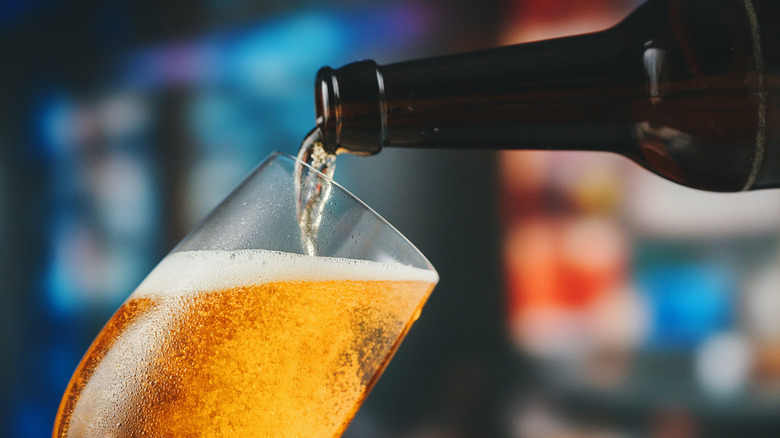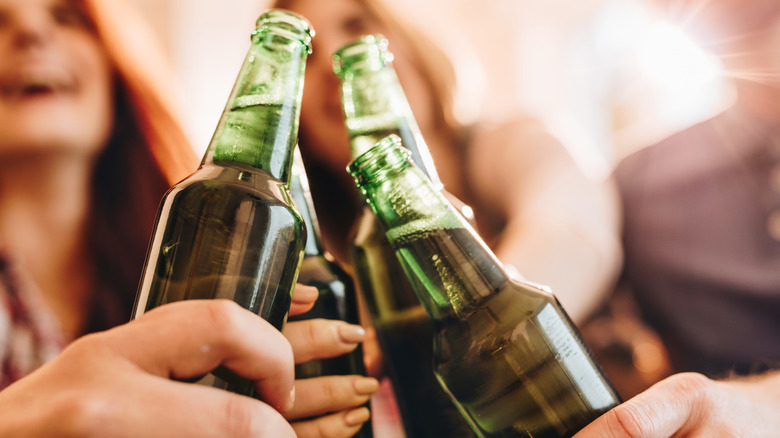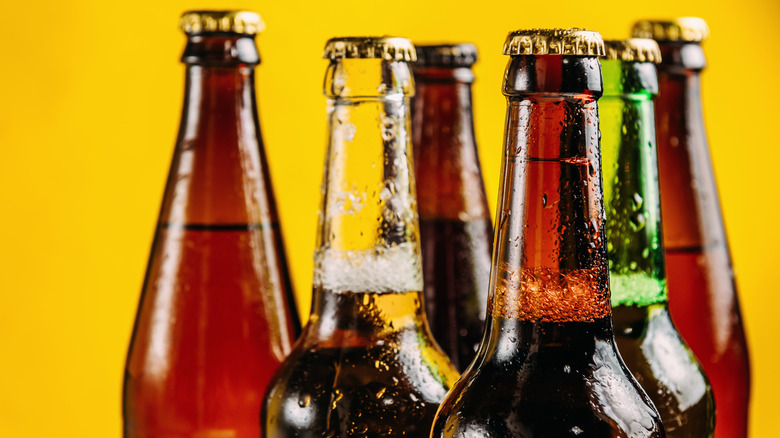How To Buy Beer To Avoid It Skunking In Storage
A cold beer on a hot day is one of life's great pleasures, and there's nothing like a couple of beers enjoyed with brisket or ribs at a barbecue. But, if you've ever eagerly cracked open a bottle only to be greeted with a foul, musty odor or sulfurous taste, the moment can be completely ruined as you find your beer is skunked.
An appropriately-named description, given the unpleasant aroma, skunking refers to the chemical process that the draught undergoes when it has been exposed to UV or fluorescent light. Also known as "lightstruck," it can essentially happen any time a bottle of beer is exposed to direct sunlight.
While a skunked beer is still safe to drink, and the alcohol content won't be affected by the process, it doesn't make for an enjoyable experience, at least in terms of flavor. All kinds of craft beers can have weird and wonderful flavor profiles, but nobody ever asked for a drink that tastes like wet cardboard, which is what you get with a skunked beer. So what can you do to prevent it from happening? It all depends on the color of the bottle and keeping it away from light.
The science behind skunked beer
Skunking is a photochemical reaction that happens with beer, which means it's all related to the effects of light. Hops is one of the main ingredients in beer, and where a lot of the flavor derives from, and also imparts some of the drink's signature bitterness. During the brewing process, hops release compounds known as iso-alpha acids. But, if the beer is exposed to sunlight, the UV light breaks down the iso-alpha acids into free radicals, which then bind with sulfur-containing proteins. The resulting compound, called MBT, causes that telltale odor, which is like that of a skunk's spray, when you open the bottle.
Your choice of brew can play a role, too, as some beers are more susceptible to skunking than others. The more hops your drink contains, the more likely it is to get skunked, which means that a flavorsome IPA can be more of a risk than a milder American lager.
While some believe that letting a beer get to room temperature and then cooling it again causes skunking, that's not actually the case. Temperature changes might make a beer taste staler due to faster oxidation, but it doesn't cause skunking. Not that anyone really wants to drink a warm beer, either way.
Choose the right colored beer bottle to prevent skunking
Skunking only happens to bottled beer, where the UV light penetrates the glass materials, so buying beer that comes in cans is the easiest way to stop it from happening altogether, since the aluminum blocks out the sun's rays. But many favorite craft beers often come in bottles. So what can you do?
The color of the bottle plays a large part in how easily the drink inside is compromised by ultraviolet rays; clear bottles, perhaps unsurprisingly, fare the worst. Green bottles cope a little better, but brown bottles are the most effective color at blocking out the light. Essentially, the darker the bottle is, the better protected the beer will be.
Sometimes, brewers will try to work around the issue of paler glass bottles by using inactive hops, which are not affected by the light. But the absolute best way to protect your precious bottles of craft beer from skunking? Keep them in the shade, or in a cooler. Drinking beer in the sun is fun, but the light can cause your drink to stink.



